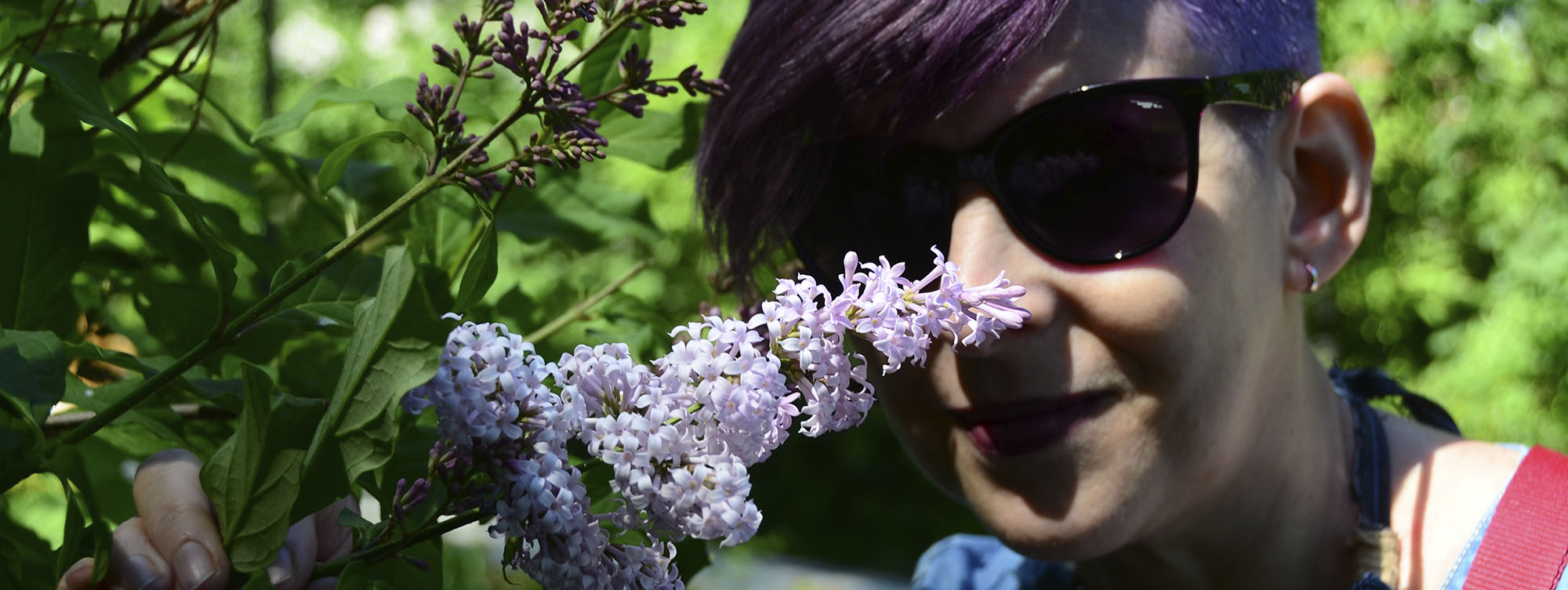Irina Povolotskaya is a writer, a painter, an actress, a psychologist, deaf-and-blind since childhood, an author of an autobiographical story “See nothing, hear nothing, speak nothing”. In her column “An alien in aquarium” for “Special view” web-portal Irina talks about her perception of the world and art as a form of therapy. This text will tell about aromas.
The first thing I remember from my life is the moment of birth: bright light, flashing spots. And smells, waves of smells... Since that time my whole life is, as well, a series of different “aromas”, synthetic perception of smells.
When I was a child, my relatives and neighbors often asked me to identify smells and their sources — what smelled in the flat and where, and if the caviar, bought for celebration, was good or not. It could be, for example, that the source of a smell in the flat were bones that the hostess’ cat hid behind the wardrobe... Caviar could smell like slime and paint, if it was colored frog caviar of that weird red one, and if it was made from petroleum products — the smell was oily and chemical.
Audio description: photo in color. Summer day in a garden. Irina, wearing dark glasses and violet blouse, leans over Alpine hill and holds a poppy flower. Her long dark hair is pulled in a tail.
This ability to smell caused me lots of troubles, until I learnt to live with it, more or less. As I grew older, the sharpness and the “shot power” of the odor waves became milder, but I still flinch from “loud smells”, same as hearing people flinch from a sudden shrill sound or flashes of light.
When the Theatre of Nations created their documentary play “Touchable”, one of its components were smells, transported into auditorium via pipes, hidden in theatre sets. The smells were to signal the change of episodes for deaf-and-blind actors and as well created an atmosphere for the viewers. It was an interesting idea, that unfortunately didn’t stay long because of technical and financial challenges. The idea to include smells into the play plot came along with my own text, which was used in the same play — from the autobiographical story “See nothing, hear nothing, speak nothing”.
The smells stay in brain as photographs and awaken memories. I remember well our trip — my father’s and mine — to the sea, to Taganrog. I just turned 12. There was a wide shady meadow in front of our house, with some benches. It was that period of year when magnolias and acacia were blooming... I enjoyed aromas so much, and there were some other bushes with bunches of light-violet flowers, spreading their aroma around. The sea heavily smelled like seaweed, and this putrid odor often made me wake up at night — I tried to learn why I kept dreaming about garbage bin full of fish peelings stored in the cupboard under the sink.
Audio description: photo in color. A group of people in the hall with dark walls and blue garlands. Irina, with her short violet hair, stands among them. She holds a muffin in her hand and smiles. She in wearing a polyethylene apron above striped violet sweater.
My frequent visits to the theatre brought me generic smell perception of old theatre auditoriums, as seen by the viewers — dried apples. And when I took the stage myself, it was the smell of work, hard work, the smell of tiredness and delight of accomplishment, finalization. And theatre curtains dust.
Each city I visited left a mark in my memory — and this mark is more “aromatic” than anything else. For example, my business trip across the United States, where I visited special institutions for blind and deaf people — Perkins School for the Blind, and Helen Keller National Center, and others.
Two main odors from New York — wet, watery, fishy, and garbage. There were small grooves everywhere under my feet, with muddy water running there. Washington — hot, it’s hard to describe its aroma. On one hand — it is dry grass, and on the other — a mix of different perfumes. I can’t say people there used perfume too much, it was like the smell of aromatic soap spread in the air. Philadelphia — chicken in all its forms and variants. I remember Boston for its technical odors and tropical downpour, which smelled like dust.
In October 2017 the play “Touchable” went on tour to London. Since then, the smell of this city is intrinsically linked for me to two major notes: the evening one — the smell of horse manure, and the day one — the smell of asphalt, greyness, dust and lots of washing machines. The smell of horse manure came from cigarette butts under my feet, and I couldn’t understand how anyone could smoke anything like this?
Paris, “the city of charm”, in December same year, brough me a vivid impression — aromas of pines from Christmas markets and blooming rose bushes in parks... Strangely enough, the city itself almost doesn’t smell, but the roads, the shops do. The Seine River smells strongly when you walk down by the water. Cafes have lots of aromas, of course, but the only one you can identify is the smell of fried potato. Later in the evening you will not even find this aroma. There are many patisseries in the city center and the aroma of croissants in the morning definitely awakes the desire to go in and have a coffee, but this aroma is almost gone after 11 AM.
Amsterdam smells like cheese. Cheese here and there, everywhere, and besides — smell of herring and water. De-Bosch — wet grass and wet stone. And the forest close to our hotel — freshness, autumn, bonfire and barbecue. My beloved Yevpatoria in October smelled like lavender and sulphur baths, that I felt few stops in advance. And teahouse as well — a mix of aromas of various herbs. I could always clearly identify if they had thyme available that day or not.
Moscow smells differently. Some places always smell like street garbage can, some have gasoline stench dominating. Before there were smells of bookstores and libraries, and I could spend half a day enjoying them. Recently a new perfume was created — featuring aromas of either newly printed or dusty book. Nostalgia. Moscow parks can smell like dry forest or (after rain) chemicals. And smokes, unfortunately. Nevertheless, I love walking in the parks, especially when it is dry and sunny autumn, with the leaves rustling under my feet, and these autumn aromas accompanied by summer smells, already fading away... Not mature yet, but kind of sweet, herbal, warm.
Long ago I wean myself from sweeties, and my sense of smell played a huge role in that. Our traditional sugar from sugar beet smells terribly to me. Aromas of spices can cover it a bit, but not completely. Common bakery from a pastry-shop doesn’t smell pleasant as well — there are technical smells in whipped cream, rancid smell of hen fodders in eggs used for bakery and bread. While aromas of quality coffee beans of proper roast and good chocolate gently tickle the nose — magical feeling, that inspires to play the flute or paint. Same effect comes from aroma and taste of real Pu-erh tea.
Audio description: photo in color. Irina is sitting in a café, with her head bowed. She has her dark hair bobbed. There is a bowl with sorbet in front of her, on the table. Blurred yellow lights and neon signs are seen in the background.
All items in our world have 4 characteristics: color, shape, sound, aroma. Sure, not everything can be touched, felt, seen or heard, and for a person with visual or hearing impairments, especially for a deaf-and-blind one, a sense of smell becomes an important channel of world perception. The world without sounds. The world without images. Yes, it is like this, forever. Each of us has its own deafness and blindness. Smells. Huge waves of aromas, various and coming from everywhere. The smell that can be seen and heard. Stronger or weaker, but always serving as navigator. We don’t hear and don’t see, but smells and tactile experience replace the sight and hearing for us. We just perceive the world a bit differently, but it is anyway our shared world.
When I finalized this article, it was November 13, a symbolic date — National Blind Persons’ Day. Winter will come soon — a period of calmness and peace, when you need more fire everywhere — both in colors and in feelings, — and fresh and tart aromas, which remind you of home, warmth and coziness. Waiting for the New Year and enjoying the beauty of sleepy world. Cinnamon and clove, tangerines and pine tar — these are all winter smells. Hot black tea with a piece of lemon and the flame of a big aromatic candle, dancing in red-and-brown liquid in a transparent glass cup.



“That day I was preparing for the psychology exam, time was running out. The last question I read on a blue-and-white screen was ‘Brain structure and function’. And this screen was the last thing I ever saw since then. A keyboard, a cup of cold coffee, a half-eaten apple. Red, juicy, solid. However, the smell of winter apples is not that pleasant...”